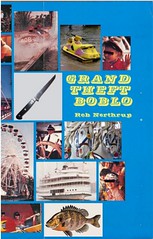After discovering a couple Chomsky and Howard Zinn lectures in RealPlayer format on WGBH.org, I stumbled on lots of literary and historical and political lectures there too. The one that almost has me sold on buying a new book (instead of waiting and hoping for the local library to buy it) is a lecture by a Boston College professor named Carlo Rotella about his book Good with Their Hands: Boxers, Bluesmen, and Other Characters from the Rust Belt.
If you're a fan of boxing or blues or the Rust Belt, it might appeal to you without further arm-twisting. But from the hints dropped in this speech, the book shows how music and sports and art has reflected the decline of industry in Chicago and NYC and the Northeast. One of these things that starts off telling about a particular hobby or artform, and winds up revealing things about society.
"I think of 'Rust Belt' as a heroic--and maybe even a poetic--term, rather than a pejorative one. Like most 'belt' usages, it probably owes its origin to 'Bible Belt,' which may have originated as a term of contempt, but becomes something else when it's used by those whose way of life the region describes. To my ear, 'Rust Belt' has the right ring: machined metal and weather. It resonates with hard use, also disuse and reuse. It sounds like the right name for a region in which you can always find your way to the railroad tracks, the old working waterfront. Somewhere in town there will be a district of large, solid brick buildings that once gave conventional form to labor, uh, to the ideas of labor and capital. And somewhere nearby will be stretches of workers' housing, arranged tightly and neatly as if they had been packed for a long voyage...."
Talking about how major boxing matches are now usually held in casinos:
"Almost everything about a casino's self-presentation, other than boxing, has been designed to make a visitor forget about work. You're intended to feel as if the money in your pocket has been magically devalued, made into something filthy, to be shed as fast as possible, by the fact that you earned it. What you need to do is launder that tainted money by cycling it through slot machines or by turning it into chips, gaming with them, and then cashing them in for better money that has been magically super-valued because you won it through lucky play.
"When you walk into a casino, especially the large sections of it dominated by cacophonous banks of slot machines, you enter a parody of a factory straight out of Modern Times or Metropolis, an atrium filled with machines feverishly tended by people who make repetitive motions for hours at a stretch. But nobody who gambles at a casino has to be good with his or her hands. And nothing is produced other than profit and loss. I think part of the meaning and perhaps the attraction of boxing for casino patrons lies exactly in the reminder it offers of work, limits, material consequences, and other subjects rendered taboo or exotic by the logic of institutionalized gaming."
If you're a fan of boxing or blues or the Rust Belt, it might appeal to you without further arm-twisting. But from the hints dropped in this speech, the book shows how music and sports and art has reflected the decline of industry in Chicago and NYC and the Northeast. One of these things that starts off telling about a particular hobby or artform, and winds up revealing things about society.
"I think of 'Rust Belt' as a heroic--and maybe even a poetic--term, rather than a pejorative one. Like most 'belt' usages, it probably owes its origin to 'Bible Belt,' which may have originated as a term of contempt, but becomes something else when it's used by those whose way of life the region describes. To my ear, 'Rust Belt' has the right ring: machined metal and weather. It resonates with hard use, also disuse and reuse. It sounds like the right name for a region in which you can always find your way to the railroad tracks, the old working waterfront. Somewhere in town there will be a district of large, solid brick buildings that once gave conventional form to labor, uh, to the ideas of labor and capital. And somewhere nearby will be stretches of workers' housing, arranged tightly and neatly as if they had been packed for a long voyage...."
Talking about how major boxing matches are now usually held in casinos:
"Almost everything about a casino's self-presentation, other than boxing, has been designed to make a visitor forget about work. You're intended to feel as if the money in your pocket has been magically devalued, made into something filthy, to be shed as fast as possible, by the fact that you earned it. What you need to do is launder that tainted money by cycling it through slot machines or by turning it into chips, gaming with them, and then cashing them in for better money that has been magically super-valued because you won it through lucky play.
"When you walk into a casino, especially the large sections of it dominated by cacophonous banks of slot machines, you enter a parody of a factory straight out of Modern Times or Metropolis, an atrium filled with machines feverishly tended by people who make repetitive motions for hours at a stretch. But nobody who gambles at a casino has to be good with his or her hands. And nothing is produced other than profit and loss. I think part of the meaning and perhaps the attraction of boxing for casino patrons lies exactly in the reminder it offers of work, limits, material consequences, and other subjects rendered taboo or exotic by the logic of institutionalized gaming."







0 Comments:
Post a Comment
Subscribe to Post Comments [Atom]
<< Home